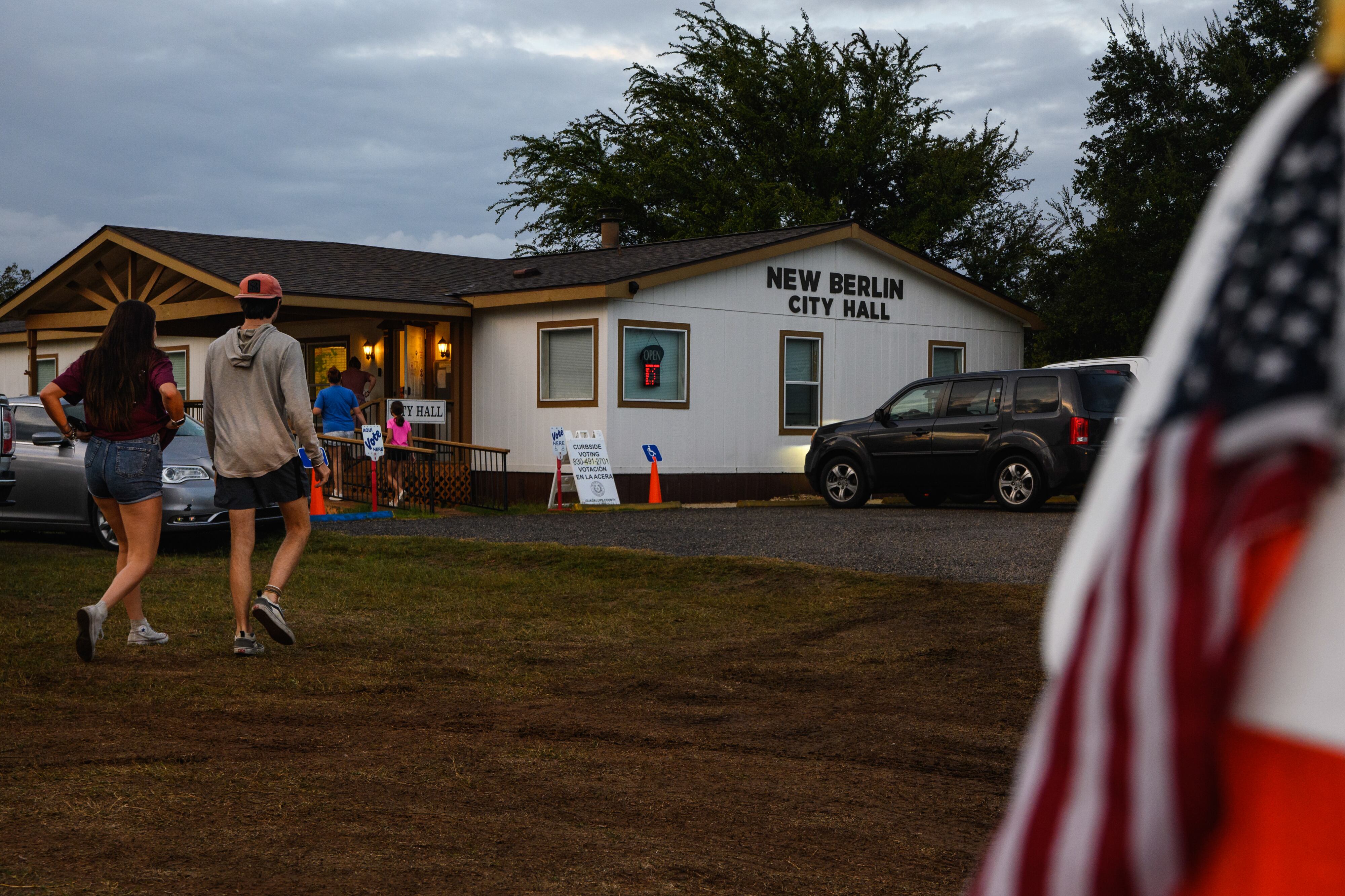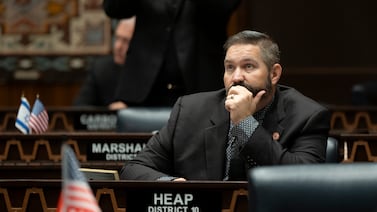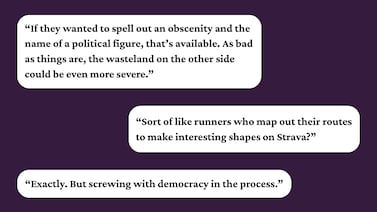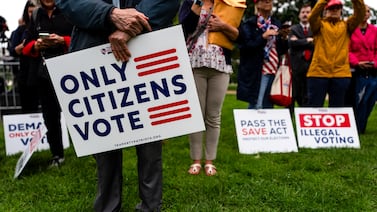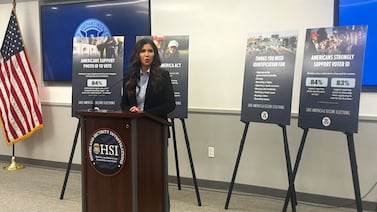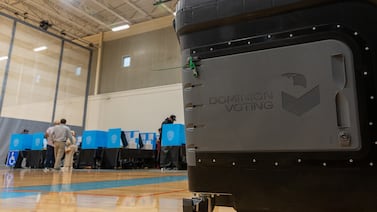Votebeat is a nonprofit news organization reporting on voting access and election administration across the U.S. Sign up for our free newsletters here.
Elections officials in some of Texas’ small counties, already strapped for resources, could face a shortage of poll workers in 2024 because of strenuous new requirements passed this year by the Legislature that force them to expand their hours and days for early voting.
The new law, authored by Rep. Valoree Swanson, a Republican from East Texas, requires all counties, regardless of population, to extend early-voting hours on weekdays and weekends. Large counties in the state already offered these extended hours, but now counties with populations of 55,000 or less must comply.
While the new law is intended to give voters in rural areas more convenience and opportunities to cast their ballots, the new requirements may be nearly impossible for some counties to pull off, election administrators told Votebeat. Local taxpayers will foot the bill for the extra costs, as the legislation provided very little additional funding.
In Llano County, a rural community northwest of Austin and home to Enchanted Rock State Park, Elections Administrator Andrea Wilson is worried she won’t find enough election workers to cover extended hours during early voting to comply with House Bill 1217.
During a legislative hearing on the bill in March, Swanson said her goal was to “make it better for our good people in rural areas.” Swanson, who represents a district in highly populous Harris County, said voters in rural areas may have to travel long distances to the polls, and the extended hours would give them more time to get there. The bill passed with bipartisan support. Swanson did not respond to a request for comment.
The number of required days and hours depends on the election. This November, when Texas is holding several municipal and constitutional amendment elections, the required hours are only slightly increased: The main early-voting location (typically the county courthouse or the elections office) must be open for 12 consecutive hours on the last two days of early voting — Thursday and Friday.
Next year, for the March primary and the November general elections, the main early voting location must be open for 12 hours every weekday during the last week of early voting. Additionally it must be open for 12 hours on the last Saturday and six hours on the last Sunday.
In small communities such as Llano County, which has just over 17,000 registered voters, the new mandates were “not well received” by longtime election workers who are older and physically would not be able to endure such schedules, Wilson said. Llano currently offers early voting from 8 a.m. to 5 p.m. Monday through Friday. Now some workers are considering not returning to work another election due to the new rules, said Wilson.
The majority of those workers Wilson may lose are election judges, the people who supervise polling locations, she said. Those same workers have years of experience and institutional knowledge that she relies on. Wilson’s concern over losing the workers pushed her to write a letter to Gov. Greg Abbott in June asking him to veto the bill, but it was too late.
“[Lawmakers] are not looking at the values of the smaller counties and how many people are not going to be willing to work on a Sunday,” Wilson added. “We’re talking about six hours on Sunday. And there are people that really hold that Sunday, it’s really that time for their worship and their families.”
In rural areas, election departments don’t have the resources to hire an entire staff. Some rural counties may have only one full-time staffer; others have up to three. And the smaller the county’s population, the fewer people who are available to work an election.
Some election officials who have seen staffing shortages and struggled in recent years to recruit election workers are reaching out to the local high schools for help.
In Jackson County, Monica Foster, the East County’s tax assessor, said that outreach has worked in her county.
“We’ve gone to the high schools and talked to students who are fixing to graduate about how to vote, how to register to vote, and then we say, ‘Hey, would you like to get paid to help us with the election?’” Foster said. “And the word has gotten around, they tell their friends, and that’s how we’ve been able to get some help.”
For other counties, however, even if the workers are available, finding enough money in the budget to pay them won’t be easy.
HB 1217 allows counties to dip into funds the state provides to counties for voter registration maintenance. The amount of money each county receives varies based on how many voters the county adds and removes from the roll, generally 25 cents to 40 cents for each. The greater the number of voters in the county, the more money it can receive.
In smaller counties, however, election officials say those funds aren’t enough to pay for extended hours and in some cases, the additional workers, who make about $12 per hour. This year, Llano County received less than $1,000 in such funds. Although that money would be just enough to pay for a single worker’s week of daily 12-hour shifts, the county must have a minimum of three workers per polling location. Additionally, the county already plans to use part of those funds to pay for costs associated with voter registration mailings in December.
Because some counties split voter registration and election administration duties between separate departments, and because those funds are used for voter registration duties, some county clerks don’t have access to that money. Laura Rogers, Sherman County clerk, told Votebeat she has no idea what that amount is “because those funds belong to the tax assessor-collector,” who in her county handles all voter registration duties.
Sherman is a small county north of Amarillo with around 1,300 registered voters. Rogers is the county clerk, the district clerk and the election official combined. She said the extended hours caused “sheer panic” in her office. Typically, early voting is done in her office and run by her and two of her staffers. Rogers does not have additional funds in her annual $22,000 election budget — which takes care of election supplies and equipment — to pay for any additional workers or extended hours.
“I’m probably just going to hire one extra person and have me work the 12-hour days, for nothing, no compensation, because we just don’t have the money in the budget,” she said. “I’m the elected official, it’s my job to make sure we’re in compliance with the law, and that’s just what we’re going to have to do,” she said.
Natalia Contreras covers election administration and voting access for Votebeat in partnership with The Texas Tribune. Contact Natalia at ncontreras@votebeat.org.

